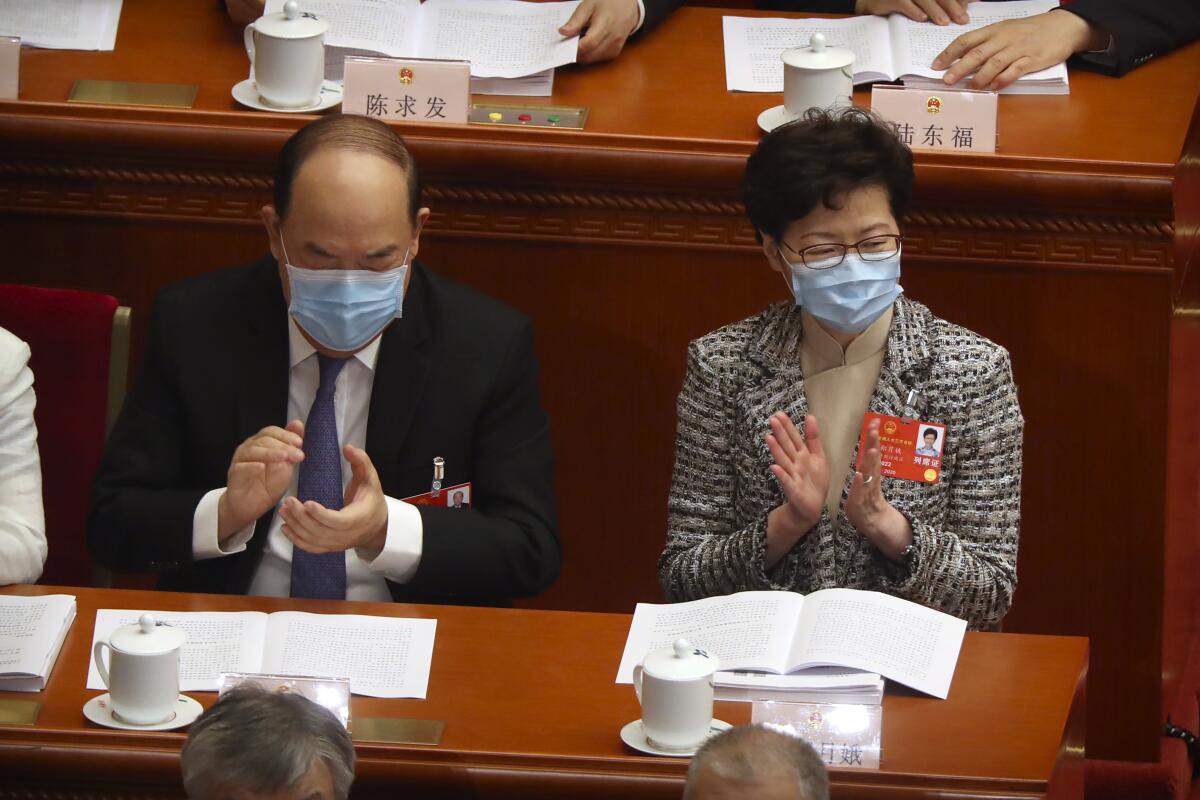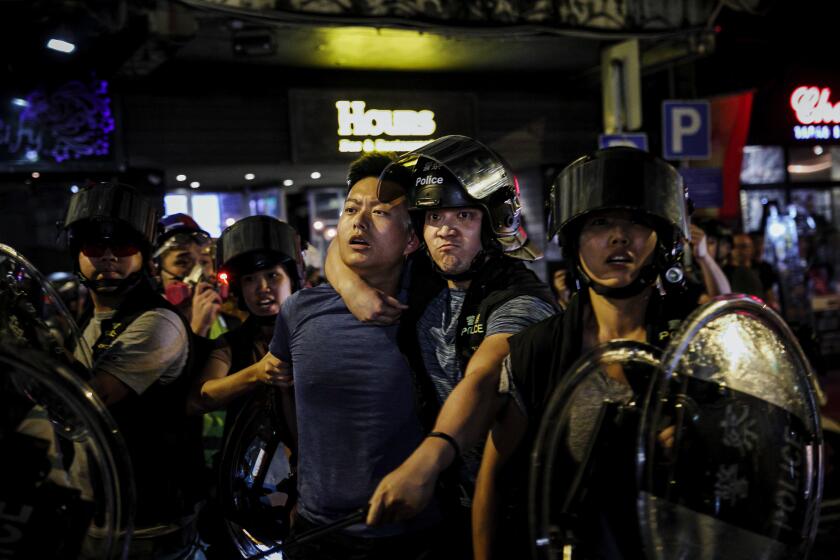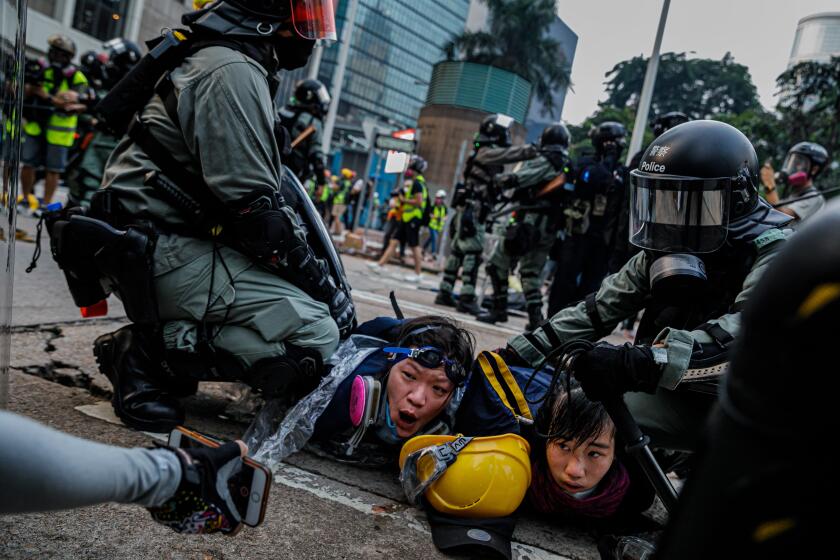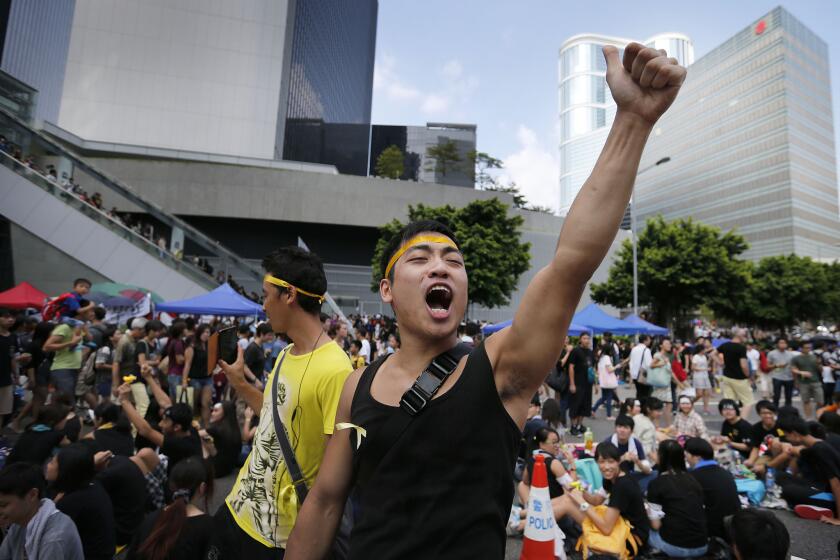Hong Kong’s pro-democracy opposition slams China’s national security law

- Share via
HONG KONG — Hong Kong’s pro-democracy lawmakers sharply criticized China’s move to enact national security legislation in the semiautonomous territory, saying it goes against the “one country, two systems” framework that promises the city freedoms not found on the mainland.
The proposed bill, submitted on the opening day of China’s national legislative session Friday, is aimed at forbidding secessionist and subversive activity, as well as foreign interference and terrorism. It comes after months of pro-democracy demonstrations last year that at times descended into violence between police and protesters.
The move, one of the most controversial items on the agenda of the National People’s Congress in years, drew strong rebukes from the U.S. government and rights groups. Despite that, Beijing appears to have lost patience and is determined to assert greater control and limit opposition activity following last year’s protests.
“Xi Jinping has torn away the whole pretense of ‘one country, two systems’,” former pro-democracy lawmaker Lee Cheuk-yan said of China’s president.
Lee said at a news briefing by opposition parties and activists that the move shows Beijing is “directly taking control.”
“They’re trying to ban every organization in Hong Kong who dares to speak out against the Communist Party,” he said, describing it as a challenge to democratic values of freedom and liberty.
Beijing seems intent on doubling down on its hardline approach. Its officials are becoming more combative
Wang Chen, vice chairman of the National People’s Congress, said the protests and violence in Hong Kong had challenged the “one country, two systems” principle and that the aim of the legislation was to stop any behavior that posed potential security threats.
Wang said Hong Kong’s legal system and enforcement must be established and improved “at the state level” to “change the long-lasting situation of defenselessness in the national security affairs in Hong Kong.”
China’s foreign ministry said that Hong Kong is China’s internal affair and “no foreign country has the right to intervene.”
“The Chinese government is determined in safeguarding national sovereignty, security, and development interests, following through the policy of ‘one country, two systems,’ and opposing any external interference in Hong Kong affairs,” ministry spokesperson Zhao Lijian said at a daily briefing.
China’s interpretation of the ‘rule of law’ governing Hong Kong is likely to further incite protesters following the arrest of activists.
A previous effort to pass such a measure in Hong Kong’s legislature was shelved after massive street protests in 2003. This time, Beijing has decided to circumvent the territory’s law-making body using what critics say are dubious legal grounds under the Basic Law, which has served as a sort of constitution for Hong Kong since its return to China from British colonial rule in 1997.
Hong Kong Chief Executive Carrie Lam said in a statement that the national security law “will not affect the legitimate rights and freedoms enjoyed by Hong Kong residents under the law, or the independent judicial power, including that of final adjudication, exercised by the Judiciary in Hong Kong.”
“I deeply believe that the national law to be enacted by the Standing Committee of the NPC will seek to practically and effectively prevent and curb acts and activities that seriously undermine national security, as well as sanction those who undermine national security by advocating ‘Hong Kong independence’ and resorting to violence,” Lam said.
While the enactment of such legislation is required under Article 23 of the Basic Law, Beijing has decided not to try to ram it through the Hong Kong legislature, said Steve Tsang, director of the China Institute at the School of Oriental and African Studies in London.
Instead, it has chosen what he called a “worse option” by proposing that the National People’s Congress in Beijing enact a national security law for the territory.
“For many in Hong Kong, the NPC enacting for Hong Kong will be tantamount to the effective end of the ‘one country, two systems’ model,” Tsang said. “I find it hard to believe this will not trigger either a massive peaceful and orderly demonstration or more vocal and aggressive protests or, indeed, most probably, a combination of both.”
A return of violent protests would be a further drag on the territory’s creaking economy, prompting multinational companies to reconsider their presence and Washington to review its policy of granting Hong Kong more advantageous trade conditions than mainland China, Tsang said.
Former Hong Kong leader C.Y. Leung defended the move in an interview with Chinese state broadcaster CCTV. He warned that the pro-democracy opposition should not “underestimate the determination of the Chinese government to deal with the issues of Hong Kong.”
Hong Kong’s government works to push through a bill that would criminalize the abuse of the Chinese national anthem.
The national security legislation neither hinders foreign investors from investing in Hong Kong, nor prevents local residents from enjoying the freedoms accorded to them by law, he said.
“To implement one country, two systems in Hong Kong, there must be laws to safeguard national security,” Leung said, noting that countries such as the United States and Singapore have strict national security laws as well.
Pro-Beijing lawmaker Martin Liao said that Hong Kong had “legal obligations” to introduce national security legislation and that, since 23 years had passed since the handover from Britain, now was a “proper time to deal with this.”
“For 23 years, in the absence of proper national security legislation, I think the central government has been very tolerant,” said Liao, during a a press briefing held by the pro-Beijing camp.
Breaking News
Get breaking news, investigations, analysis and more signature journalism from the Los Angeles Times in your inbox.
You may occasionally receive promotional content from the Los Angeles Times.
Pro-democracy lawmaker Tanya Chan countered that the proposal goes against the Basic Law. “It is a complete dishonor of promises made under the Sino-British Join Declaration, as well as all the promises made by the Chinese government to us and the world,” she said.
Taiwan’s government urged Beijing not to lead Hong into “greater turmoil” with the proposed national security law, stating that it would cause dissatisfaction and social instability.
“The laws of any civilized society should be an umbrella to protect the people, rather than shackles on their freedom,” Taiwan’s Mainland Affairs Council said in a statement.
More to Read
Sign up for Essential California
The most important California stories and recommendations in your inbox every morning.
You may occasionally receive promotional content from the Los Angeles Times.













